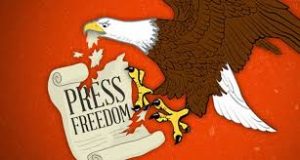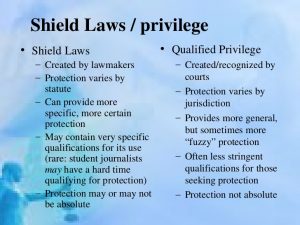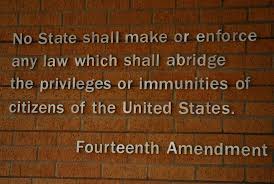 Speaking before the Conservative Political Action Conference President Donald Trump has pronounced about the news media: “They shouldn’t be allowed to use sources unless they use somebody’s name,” he declared. “Let their name be put out there.”
Speaking before the Conservative Political Action Conference President Donald Trump has pronounced about the news media: “They shouldn’t be allowed to use sources unless they use somebody’s name,” he declared. “Let their name be put out there.”
THIS IS AN ATTACK AGAINST THE CALIFORNIA CONSTITUTION:
ARTICLE I, SECTION 2.
(a) Every person may freely speak, write and publish his or her sentiments on all subjects, being responsible for the abuse of this right. A law may not restrain or abridge liberty of speech or press.
(b) A publisher, editor, reporter, or other person connected with or employed upon a newspaper, magazine, or other periodical publication, or by a press association or wire service, or any person who has been so connected or employed, shall not be adjudged in contempt by a judicial, legislative, or administrative body, or any other body having the power to issue subpoenas, for refusing to disclose the source of any information procured while so connected or employed for publication in a newspaper, magazine or other periodical publication, or for refusing to disclose any unpublished information obtained or prepared in gathering, receiving or processing of information for communication to the public.
Nor shall a radio or television news reporter or other person connected with or employed by a radio or television station, or any person who has been so connected or employed, be so adjudged in contempt for refusing to disclose the source of any information procured while so connected or employed for news or news commentary purposes on radio or television, or for refusing to disclose any unpublished information obtained or prepared in gathering, receiving or processing of information for communication to the public.
As used in this subdivision, “unpublished information” includes information not disseminated to the public by the person from whom disclosure is sought, whether or not related information has been disseminated and includes, but is not limited to, all notes, outtakes, photographs, tapes or other data of whatever sort not itself disseminated to the public through a medium of communication, whether or not published information based upon or related to such material has been disseminated.
(Sec. 2 amended June 3, 1980, by Prop. 5. Res.Ch. 77, 1978.)
In Constitutional law, there are rights, privileges, and immunities. Article I, Section 2(b) establishes an immunity. It means that the press is immune from a contempt proceeding for refusing to disclose confidential sources.
This provision was passed by California voters in response to court decisions Rosato v. Superior Court, 51 Cal. App. 3d 190 (1975) and Farr v. Superior Court, 22 Cal. App. 3d 60 (1971), both of which affirmed orders compelling reporters to divulge sources of information regarding pending criminal trials.
 After this 1980 amendment to the state constitution in New York Times Co. v. Superior Court, 51 Cal. 3d 453 (1990), the California Supreme Court held that a civil litigant has no interests sufficient to overcome the constitutional reporter’s privilege. Id. At 456. In Miller v. Superior Court, 21 Cal. 4th 883 (1999), the Supreme Court held that a prosecutor in a criminal action has no interests sufficient to overcome the reporter’s immunity. Id. at 901. The Supreme Court explained in Miller, “the absoluteness of the immunity embodied in the shield law only yields to a conflicting federal or, perhaps, state constitutional right.” Id.
After this 1980 amendment to the state constitution in New York Times Co. v. Superior Court, 51 Cal. 3d 453 (1990), the California Supreme Court held that a civil litigant has no interests sufficient to overcome the constitutional reporter’s privilege. Id. At 456. In Miller v. Superior Court, 21 Cal. 4th 883 (1999), the Supreme Court held that a prosecutor in a criminal action has no interests sufficient to overcome the reporter’s immunity. Id. at 901. The Supreme Court explained in Miller, “the absoluteness of the immunity embodied in the shield law only yields to a conflicting federal or, perhaps, state constitutional right.” Id.
CALIFORNIA MUST DEFEND ITS CONSTITUTION
California’s legislature should draw a line in the sand and pass a resolution denouncing the President’s attack on our Constitution. I am going to ask my union, the Freelancer Unit of Pacific Media Workers Guild, Local 39521 CWA, AFL-CIO, CLC in turn to pass a resolution asking the California legislature to take this position.



You must log in to post a comment.